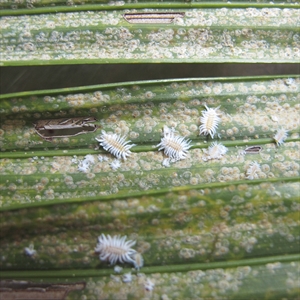- Widespread distribution. In Oceania, Fiji, French Polynesia, Northern Mariana Islands, Vanuatu. Preys on coconut scale (and other armoured scales, e.g., white peach scale. Eats up to 20 scales a day.
- Eggs laid under scale covers (after scale eaten). Larvae yellow, covered in waxy filaments (outgrowths). Adults, nearly round with black wing cases and brown heads.
- Said to be effective in Fiji (distributions made throughout country) and Jamaica against coconut scale, but poor results elsewhere. Not certain if still in Fiji.
- Biosecurity: need to assess risk before introduction as it is not specific to coconut scale.
- Cultural control: hot water to kill ants: 47°C (note, 49°C kills plants).
- Management: (i) move adults and larvae to colonies of pests; (ii) use sleeve cages to protect populations initially; (iii) avoid use of organophosphates, carbamates and synthetic pyrethroids; (iv) control ants: (a) stomach poisons (fipronil, Amdro®, borax), (b) growth regulators (methoprene, pyriproxyfen), (c) nerve poisons (bifenthrin, fipronil, imidacloprid). See (http://piat.org.nz/getting-rid-of-ants).
Pacific Pests, Pathogens and Weeds - Online edition
Pacific Pests, Pathogens, Weeds & Pesticides
Cryptognatha nodiceps (396)
Coconut scale ladybird beetle. (No generally accepted common name found.)
Cryptognatha nodiceps
AUTHOR Grahame Jackson
1Swaine G (1971) Agricultural Zoology in Fiji. Her Majesty's Stationery Office. London; and 2Lopez VF et al. (2004) Biology and prey range of Cryptognatha nodiceps (Coleoptera: Coccinellidae), a potential biological control agent for the coconut scale, Aspidiotus destructor (Hemiptera: Disapididae). Biocontrol Science and Technology 14, 475-485; and Gordon RD et al. (1985) The Coccinellidae (Coleoptera) of America North of Mexico. Journal of the New York Entomological Society Vol.93(1). pp 1-912; and Vandenberg NJ (2002) Family 93 Coccinellidae Latreille 1807. In: 'American Beetles Volume 2'. Eds Arnett RH Jr et al. CRC Press Baton Rouge; and Waterhouse DF, Norris KR (1987) Biological Control Pacific Prospects. Inkata Press; and from Pacific Invasive Ant Toolkit. (http://piat.org.nz/index.php?page=getting-rid-of-ants/).
Produced with support from the Australian Centre for International Agricultural Research under project HORT/2016/18: Responding to emerging pest and disease threats to horticulture in the Pacific islands, implemented by the University of Queensland and the Pacific Community.




